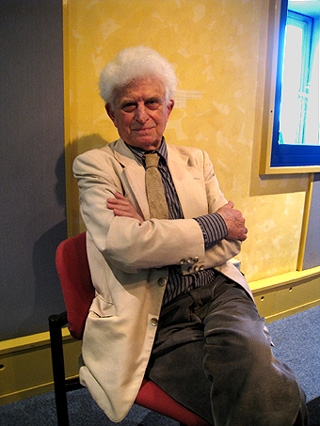Jean Bollack (1923-2012)
When I think of Jean Bollack — philologist, philosopher, hermeneut, translator, commentator, friend to Paul Celan & irritant to many — the first word that comes to mind is “décrasser,” a French term that means to clean, to scrub or more powerfully, to scour, even dip into a bath of acid to remove the accumulated gangue of lazy thought & language. He did this mostly to the Greek tragedies and the pre-socratic philosophers, both in translating them and in rethinking their thought — two linked activities as his focus on language, on the word itself, buttressed his approach. Charles Olson would have loved this near-monomaniacal but polyvalent insistence on the texts of Heraclitus, Parmenides and Empedokles, among others, that loudly demand that the pre-Socratics be read exactly as if they were new, i.e. not yet en-gangued by two millennia of Platonic and Aristotelean (Ari-stottle: Bollack would have loved Olson’s play) impositions of discourse as logos. Though Bollack was also, and accurately so, weary of the possible “other” of logos, namely the Heidegerrian idea of Being. (Bollack has an excellent essay on Celan’s poem Todtnauberg, the conclusions of which — if not the argument or reading of the poem itself — are close to my own in my essay “Translation at the Mountain of Death”). His work has remained essentially untranslated, as far as I am aware, which is a shame, though understandable, for one because so much focuses on bringing the Greeks into French (translations of translations being considered redundant — but why should that be, in a polylingual world no longer divisible between the binary of les anciens — Greeks & Romans, no one else — and les modernes — those Northern imperial nations claiming logos & techné as their own?). Secondly, I think, in the case of his very important work on Paul Celan, it is because no one has as yet had the courage to go at what are highly complex, idiosyncratic texts. His time will come, I hope — it has to, malgré the man’s pigheadedness, for he did do major work, and two of the great 20C poets approved: Celan thought well of both their friendship and Bollack’s thinking about poetry, and Henri Michaux thought Bollack’s translations of Empedokles excellent. Here is an extract of the latter:
«Double ce que je vais dire
Plutôt l’un croît pour seul être de plusieurs qu’il était
Plutôt il se sépare et devient pluriel d’un qu’il fut
Double la naissance des choses mortelles, double leur dépérissement
Si une, la rencontre de tous l’enfante et l’emporte à la fois
L’autre, dispersant, se disperse quand ils se séparent à nouveau
Et jamais ils ne cessent d’échanger leur chemin
Tantôt par amour se rencontrant tous dans l’un
Tantôt emportés chacun au loin par la haine de Discorde
Et quand l’un se sépare encore le multiple s’accomplit.»


 Poasis II: Selected Poems 2000-2024
Poasis II: Selected Poems 2000-2024 “Todesguge/Deathfugue”
“Todesguge/Deathfugue” “Interglacial Narrows (Poems 1915-2021)”
“Interglacial Narrows (Poems 1915-2021)” “Always the Many, Never the One: Conversations In-between, with Florent Toniello”
“Always the Many, Never the One: Conversations In-between, with Florent Toniello” “Conversations in the Pyrenees”
“Conversations in the Pyrenees” “A Voice Full of Cities: The Collected Essays of Robert Kelly.” Edited by Pierre Joris & Peter Cockelbergh
“A Voice Full of Cities: The Collected Essays of Robert Kelly.” Edited by Pierre Joris & Peter Cockelbergh “An American Suite” (Poems) —Inpatient Press
“An American Suite” (Poems) —Inpatient Press “Arabia (not so) Deserta” : Essays on Maghrebi & Mashreqi Writing & Culture
“Arabia (not so) Deserta” : Essays on Maghrebi & Mashreqi Writing & Culture “Barzakh” (Poems 2000-2012)
“Barzakh” (Poems 2000-2012) “Fox-trails, -tales & -trots”
“Fox-trails, -tales & -trots” “The Agony of I.B.” — A play. Editions PHI & TNL 2016
“The Agony of I.B.” — A play. Editions PHI & TNL 2016 “The Book of U / Le livre des cormorans”
“The Book of U / Le livre des cormorans” “Memory Rose Into Threshold Speech: The Collected Earlier Poetry of Paul Celan”
“Memory Rose Into Threshold Speech: The Collected Earlier Poetry of Paul Celan” “Paul Celan, Microliths They Are, Little Stones”
“Paul Celan, Microliths They Are, Little Stones” “Paul Celan: Breathturn into Timestead-The Collected Later Poetry.” Translated & with commentary by Pierre Joris. Farrar, Straus & Giroux
“Paul Celan: Breathturn into Timestead-The Collected Later Poetry.” Translated & with commentary by Pierre Joris. Farrar, Straus & Giroux